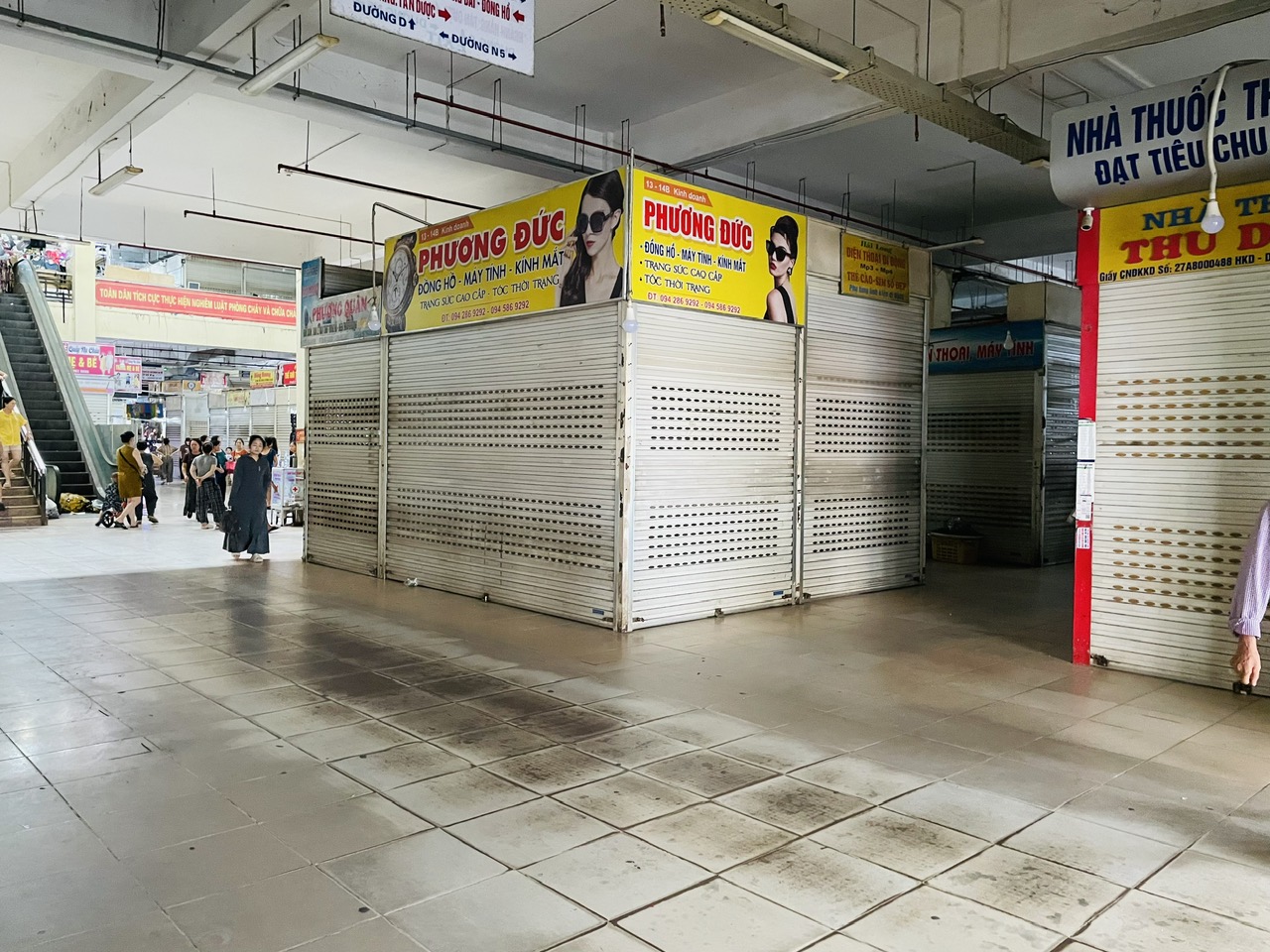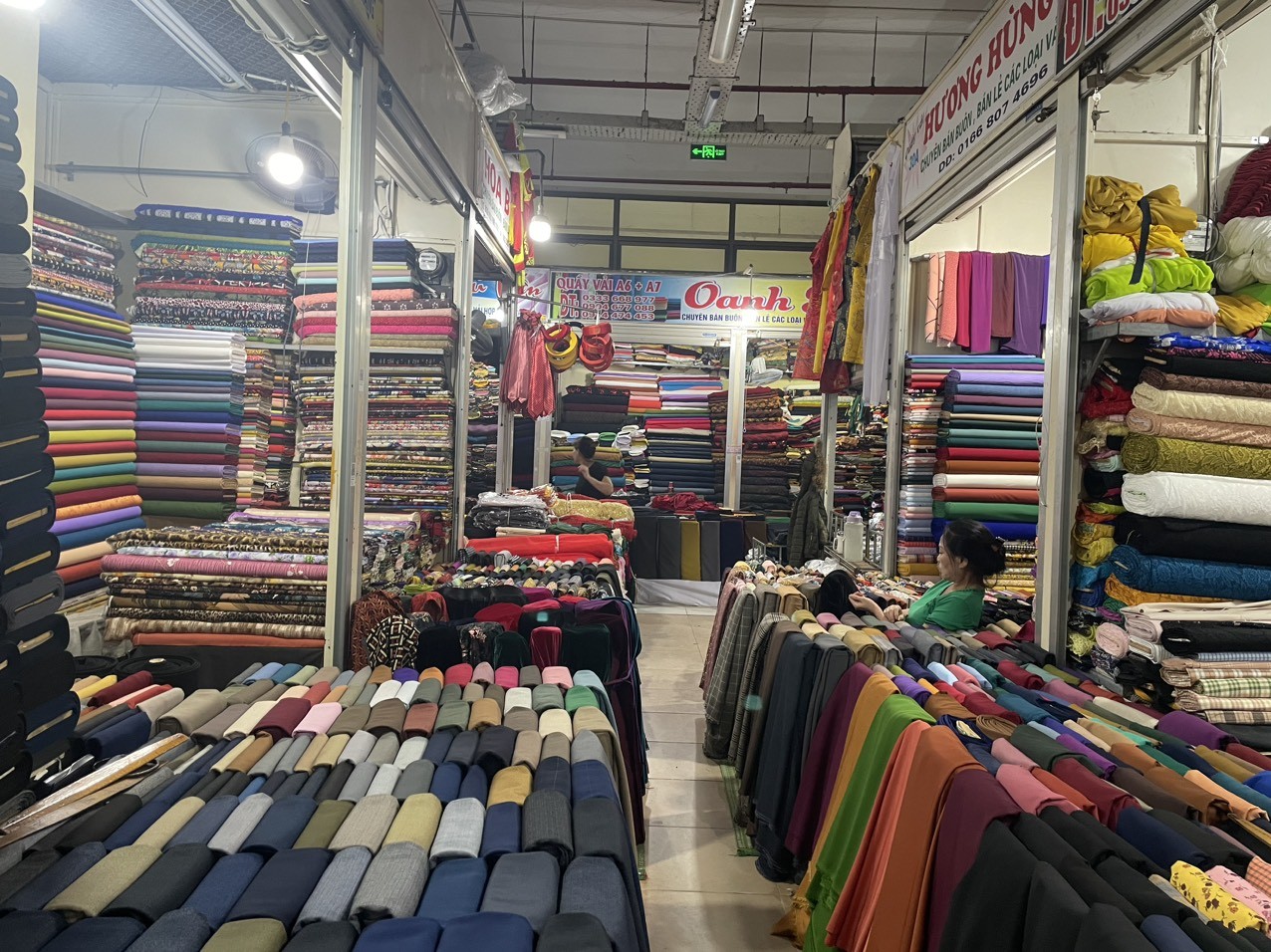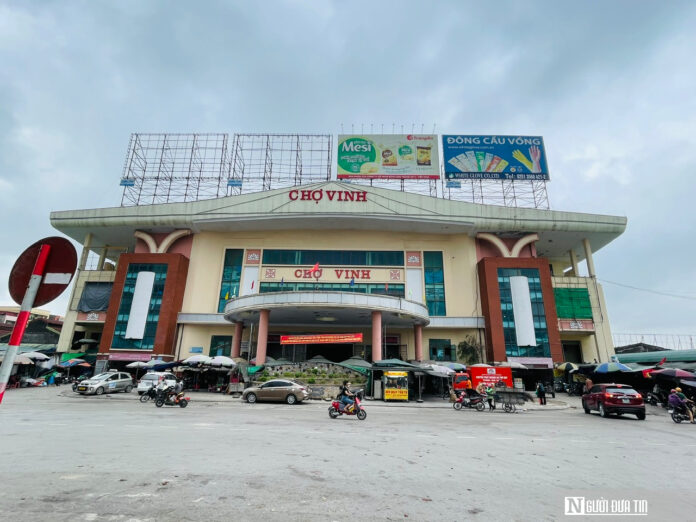
Chợ Vinh, Nghệ An, once a bustling hub, has seen a decline in footfall due to the rise in online shopping.
Chợ Vinh in the city of Vinh, Nghệ An province, was once known as the largest wholesale market in the province, with over 1,000 businesses. However, in recent years, the rise of online shopping has led to a decline in footfall, resulting in a gloomy and quiet atmosphere, and significantly impacting the traders’ income.

Many kiosks at Chợ Vinh have closed down due to a combination of factors, including high taxes and the rise of online shopping.
According to reports by Người Đưa Tin, in the past few days, numerous kiosks on the first and second floors have shut down. Only a handful of shops remain open, selling miscellaneous goods, pharmaceuticals, and some common fashion items.

Traders have cited high taxes as the main reason for closing down, even as authorities crack down on illegal trade.
Interestingly, the closure of these kiosks coincides with a heightened campaign by authorities to combat smuggling, commercial fraud, and counterfeit goods. However, most traders attribute their decision to close to excessively high taxes, which they claim are disproportionate to their actual business situation.

Despite a 20-25% reduction in taxes, traders still find the rates too high compared to other markets.
According to the rates stipulated in Decision 73/2016/QĐ-UBND by the Nghệ An provincial People’s Committee, the monthly rent for a corner lot of type 1 at Chợ Vinh is 190,000 VND/m², type 2 is 166,000 VND/m², and type 3 is 142,000 VND/m². For regular stalls, type 1 is 130,000 VND/m² and type 2 is 118,500 VND/m². Following petitions from traders, the tax rates for fixed corner kiosks and regular kiosks in the market have been reduced by 20-25%.

Traders still consider the taxes too high and have petitioned for further reductions, citing additional costs for electricity, water, and sanitation.
However, the traders at Chợ Vinh believe that the rates are still too high and unreasonable. In addition to the high kiosk rental fees, there are other expenses such as electricity, water, and sanitation fees. According to Ms. Nguyễn Thị Tâm, a trader at Chợ Vinh, even with the 25% reduction, the tax rates are still four times higher than those at Chợ Ga Vinh. Hundreds of traders have submitted eight petitions to the authorities, requesting a review and adjustment of the taxes to match their actual business situation.

Ms. Tâm, a long-time trader at Chợ Vinh, expresses concern over the high taxes and their impact on her family’s livelihood.
“My family has been trading at Chợ Vinh for decades, and our livelihood depends on this business,” says Ms. Tâm. “Since the end of 2024, the kiosk taxes have been extremely high, and with the current business difficulties and sluggish sales, we are very worried. I have two kiosks with a total area of over 8m², and according to the new tax rates, I have to pay almost 1.5 million VND per month. With our current income, we cannot afford to pay the taxes.” She adds that most traders have closed their kiosks due to financial constraints rather than fear of inspections.

Some traders have put their kiosks up for sale due to financial difficulties.
Many traders have been forced to put their kiosks up for sale due to financial constraints. “Previously, when the market was slow, 30-40% of traders had to close down due to a lack of sales,” says a trader. “Recently, many traders here have closed their doors and gone to the market management to demand their rights because the rent is too high. With the current income, they cannot afford the rent. Many traders are not opening their kiosks because they cannot sell their goods, not because they are afraid of inspections.”
-

Nghệ An: Chợ ế ẩm, nhiều tiểu thương lo “mất” Tết ĐỌC NGAY

Mr. Nguyễn Hữu Đắc, Head of Chợ Vinh Management, acknowledges the impact of high rents and other factors on traders’ decision to close their kiosks.
Mr. Nguyễn Hữu Đắc, Head of Chợ Vinh Management, acknowledges that there are multiple factors contributing to the closure of kiosks, including high rents and a decrease in customer numbers. Traders attribute the high rents to Decision 73/2016/QĐ-UBND, which adjusted the rental rates for Chợ Vinh higher than the market average. Additionally, the current infrastructure and facilities are not as attractive as before, leading to a decline in business. The management has taken note of the traders’ concerns and has petitioned the authorities of Vinh city and Nghệ An province to review and adjust the rents to match the actual business situation. Mr. Đắc also mentions that during the peak month of anti-smuggling and anti-commercial fraud campaigns, there may be cases where traders do not have complete documentation for their goods, but assures that the majority of goods in Chợ Vinh have clear origins.
The management of Chợ Vinh is currently encouraging traders to reopen their kiosks, sell goods with clear origins, and comply with legal regulations to protect consumers’ rights.
The Power of Words: Crafting Compelling Copy for Online Success
“Unveiling the Secrets to Captivating Customers: Why Choosing the Right Platform Matters, as Shared by the CEO of The Gioi Di Dong”
MWG makes a comeback in the e-commerce arena with the launch of the MWG Shop app, marking a strategic shift in their approach. In a focused effort to leverage their existing retail ecosystem, MWG has decided to forego a presence on TikTok Shop and Lazada. This bold move signals a new chapter in their journey, as they chart a unique path in the competitive world of online retail.
The Great Unveiling: Unmasking the Long-Standing Fake Goods Trade at Cho Ninh Hiep
The issue of counterfeit, substandard, and fake goods affecting consumers has caught the attention of many members of parliament. This is a pressing matter that demands our utmost attention and collective efforts to address and eradicate.
The Ultimate Guide to Start-up Success: Surviving the First 3 Years Without a Salary, Living in a Warehouse
Douglas Tan, the charismatic and visionary entrepreneur, founded Magix after facing numerous setbacks in his pursuit of career re-entry. Despite possessing impressive credentials, expertise, and experience, his journey began with a series of unsuccessful attempts to reintegrate into the workforce.





















